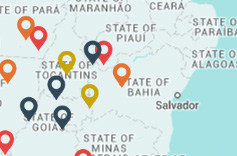Institute of Black Women, Amapá State (IMENA)
Respecting Rights, Acknowledging Duties
Amapá
The mission of IMENA is to fight prejudice, racial discrimination, and sexism and to struggle for the universal enforcement of human rights.
With more than seven years of experience, the Institute provides an interface between various social networks, like the National Human Rights Movement, National Network of Black Women, Network of Black Women from the Brazilian Amazonia, Amapá Forum of Rural and Urban Black Organizations, Amazonia Network of Women Entrepreneurs, and the Lai Apejo Network, which deals with the black population’s health issues.
Through training, education, and research projects, the organization promotes safeguards for the human rights of the Black population, women, and especially Black women.
A key project is Woman, Your Body Belongs to You, focused on training multipliers to fight violence against women. This project was held three times, in 2003, 2005, and 2007 (a total of 220 women benefited directly and 880 indirectly).
Meanwhile, the research project Health, a Legal Right, the Right of All, for the promotion of the Black population and empowerment of community leaders, trained 20 rural leaders. And the project Open Your Eyes! You Have Rights increased the visibility of the daily institutional violence experienced by rural Black communities in Amapá State, in the counties of Macapá and Itaubal.
The Project
“Respecting Rights, Acknowledging Duties” is a spinoff of the project Open Your Eyes. A participatory survey in 17 quilombos (maroon communities, or descendants of escaped slaves) revealed the widespread lack of basic sanitation, inefficient health services and education, and absence of social, environmental, and economic programs and projects.
In this proposal, based on data from the survey, IMENA intends to hold a campaign to increase the visibility of these issues for society as a whole in Amapá.
The project plans for media coverage (electronic releases) and a 10-minute documentary on how violence and institutional racism appear in daily attitudes and behaviors that feed discrimination through unintentional prejudice.
The project will focus on different forms of ignorance, lack of attention, and racist stereotypes that jeopardize ethnic minorities.
Funding Line
Annual Call for Proposals
Year
-
Total Granted
-
Duration
-
Main Themes
Confronting racism






